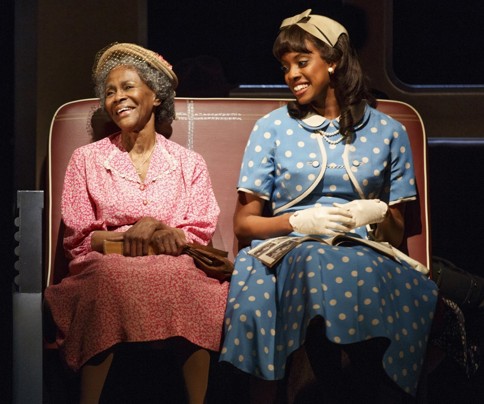In today’s Wall Street Journal “Sightings” column I talk about how audiences respond differently to different art forms–and how the unexpected response to the Broadway revival of The Trip to Bountiful enhances the effect of the show. Here’s an excerpt.
* * *
Carrie Watts, the character played by Cicely Tyson in the Broadway revival of Horton Foote’s “The Trip to Bountiful,” is an old woman from a small Texas town who likes to sing hymns to herself. When Ms. Tyson did so at the preview performance that I saw a couple of weeks ago, a fair number of people in the theater sang along with her. It didn’t look to me as though she was trying to encourage them, either: They just joined in.
 I wondered whether the same thing was happening at other performances. Then I got this e-mail from a friend who had seen the play the preceding week: “Did the audience sing along with the hymns on the night you saw ‘Bountiful’? Three women sitting next to me started singing along, softly at first, and by the second hymn a good part of the audience was joyously singing with them. The theatre was everyone’s church that night, not just mine. To describe it sounds hokey, but it was anything but.” I couldn’t agree more, and it reminded me anew that the unpredictability of the audience can be one of the most thrilling aspects of a live performance….
I wondered whether the same thing was happening at other performances. Then I got this e-mail from a friend who had seen the play the preceding week: “Did the audience sing along with the hymns on the night you saw ‘Bountiful’? Three women sitting next to me started singing along, softly at first, and by the second hymn a good part of the audience was joyously singing with them. The theatre was everyone’s church that night, not just mine. To describe it sounds hokey, but it was anything but.” I couldn’t agree more, and it reminded me anew that the unpredictability of the audience can be one of the most thrilling aspects of a live performance….
I wonder whether the fact that Michael Wilson’s revival of Mr. Foote’s play features a mostly black cast might have something to do with the way in which audiences are reacting to it. In my experience, a theater audience that contains a significant number of blacks is prone to be more vocal in its response to a show. When an actor speaks a line that strikes a chord with black theatergoers, many of them will say “Uh-HUH!” or “That’s right!” out loud. Black churchgoers, of course, often do the same thing at Sunday-morning services, and I suspect that the amen-like responses of black theatergoers are a not-so-distant echo of that old-time religion….
I’ll never forget seeing George Balanchine’s “Prodigal Son” performed by Dance Theatre of Harlem for a mostly black audience. At one point in the ballet, the dancers unexpectedly form a human merry-go-round. I’d seen it happen a half-dozen times without incident in the past, but that night the audience let out a huge whoop of delight at the sheer cheekiness of Balanchine’s choreography. And did I join in? You bet….
* * *
Read the whole thing here.
An excerpt from George Balanchine’s Prodigal Son, performed by Mikhail Baryshnikov, Karin von Aroldingen, and New York City Ballet. The score is by Sergei Prokofiev:
Archives for May 2013
TT: Almanac
“Authors give away their books like drug barons give free snorts, hoping to start an expensive addiction.”
Reginald Hill, Death’s Jest-Book (courtesy of Mrs. T)
TT: Long distance, please
Paul Moravec, my operatic collaborator, is currently in residence at the American Academy in Rome. He’s writing the score of The King’s Man, our third opera, which opens in Louisville in October.
 As for me, I’ve been tearing around America ever since the Broadway season ended–but not this week. Mrs. T, spotting four dark days on my calendar, suggested that we might want to spend them taking a work-free mini-vacation at Ecce Bed and Breakfast, our beloved and indispensable Delaware River retreat. That sounded good to me, so we drove to Ecce on Monday and proceeded to do…nothing. Lots of nothing. We slept late, ate tasty breakfasts, sat in the sun, read in the afternoons, and watched movies at night (among them The Ladykillers, The Man in the White Suit, and Citizen Kane).
As for me, I’ve been tearing around America ever since the Broadway season ended–but not this week. Mrs. T, spotting four dark days on my calendar, suggested that we might want to spend them taking a work-free mini-vacation at Ecce Bed and Breakfast, our beloved and indispensable Delaware River retreat. That sounded good to me, so we drove to Ecce on Monday and proceeded to do…nothing. Lots of nothing. We slept late, ate tasty breakfasts, sat in the sun, read in the afternoons, and watched movies at night (among them The Ladykillers, The Man in the White Suit, and Citizen Kane).
All that relaxation notwithstanding, Paul and I did manage to cross paths–in cyberspace. I spent most of yesterday afternoon revising the libretto of The King’s Man, then e-mailing new text to Rome for him to set. He e-mailed the music back to me as soon as he finished composing it. At one point we were working in something not far removed from real time.
Was I breaking my solemn promise not to work during our mini-vacation? I think not, and Mrs. T agrees. Revision is pleasurable puttering. Drafting is work–sometimes hard, sometimes less so, but ever and always work. Revising, by contrast, is mostly pure fun, like solving a wonderfully complex puzzle. Writing a first draft sometimes feels like putting together a jigsaw puzzle whose pieces are blank.
So I enjoyed myself yesterday, very much so, not least because I was thoroughly bemused by the fact that I was spending the day in close harness with someone who was halfway around the world from me. (Somehow I doubt that Richard Strauss and Hugo von Hofmannsthal did it that way.) Yet I was glad to wrap up my puttering, shoot a new draft of The King’s Man off to Rome, and resume the no less satisfying “job” of listening to the peaceful sound of rain falling on Ecce’s sturdy roof.
We’re still at Ecce, by the way, and utterly happy to be. You can never spend enough time doing nothing.
* * *
Waylon Jennings sings “Are You Sure Hank Done It This Way” at the Grand Ole Opry in 1978:
TT: So you want to see a show?
Here’s my list of recommended Broadway, off-Broadway, and out-of-town shows, updated weekly. In all cases, I gave these shows favorable reviews (if sometimes qualifiedly so) in The Wall Street Journal when they opened. For more information, click on the title.
BROADWAY:
• Annie (musical, G, reviewed here)
• Matilda (musical, G, all performances sold out last week, reviewed here)
• The Nance (play with music, PG-13, extended through Aug. 11, reviewed here)
• Once (musical, G/PG-13, most performances sold out last week, reviewed here)
• The Trip to Bountiful (drama, G, extended through Sept. 1, reviewed here)
OFF BROADWAY:
• Avenue Q (musical, R, adult subject matter and one show-stopping scene of puppet-on-puppet sex, reviewed here)
• The Fantasticks (musical, G, suitable for children capable of enjoying a love story, reviewed here)
CLOSING SOON OFF BROADWAY:
• Women of Will (Shakespearean lecture-recital, G/PG-13, closes May 26, reviewed here)
CLOSING SOON IN CHICAGO:
• Pal Joey (musical, PG-13, closing May 26, reviewed here)
CLOSING NEXT WEEK IN CHICAGO:
• Woman in Mind (serious comedy, PG-13, closing May 19, reviewed here)
CLOSING NEXT WEEK OFF BROADWAY:
• Orphans (drama, PG-13, closing May 19, reviewed here)
CLOSING SUNDAY OFF BROADWAY:
• Talley’s Folly (drama, PG-13, reviewed here)
TT: Almanac
“Cap, who sometimes had a problem working out when Dalziel’s political incorrectness was post-modern ironical and when it was prehistoric offensive, turned the sound back on.”
Reginald Hill, Death’s Jest-Book (courtesy of Mrs. T)
TT: Snapshot
András Schiff, Simon Rattle, and the Birmingham Symphony perform the first movement of Bartók’s Third Piano Concerto:
(This is the latest in a series of arts-related videos that appear in this space each Monday and Wednesday.)
TT: Almanac
“Happiness lies in the consciousness we have of it, and by no means in the way the future keeps its promises.”
George Sand, Handsome Lawrence
OGIC: All in the dances
I’m the furthest thing from a music critic, but I saw something I loved, so here you go. Last weekend Chicago’s Lyric Opera premiered a new production of Oklahoma! directed by Gary Griffin. It’s a special show. The music and singing are as full-blooded and full-throated as you would expect of the Lyric. As Chris Jones wrote in his Chicago Tribune review, “listening to a full-sized orchestra playing the original orchestrations” is an “increasingly rare treat.” Saturday night it did feel rare and rich.
The production had visual magic too. The first thing you get to look at, during the overture, is an achingly lovely painted backdrop–a criss-cross of crops in pinks and purples against a butter-yellow sky. It’s a recognizably American, fruited-plain landscape rendered in a wistful palette that reminded me of Pierre Bonnard. The sets themselves–house, barn, shed–are classic, solid Americana against the impressionism of the backdrops, echoing the show’s two registers.
The heart of Oklahoma! is its songs, of course, and they were well served here. I got a series of shivers during the iconic title song, hard and bright, with its beeline for the nerve endings. I wished it would go on and on. But the show’s soul, for me, lies in the darker dream interlude at the end of Act I, which works more mysteriously on those nerves as the show shifts from one dramatic language to another.
This sequence, in the Lyric’s production, is unforgettable. A gorgeous piece of dancing, it’s also authentic–the 91-year-old Gemze de Lappe, who danced in Oklahoma! in 1943, recreated Agnes de Mille’s original choreography for the Lyric, to wondrous effect. I was entranced–almost literally. (Incidentally, it also put me in mind of Chicago Shakespeare’s 2011 production of Follies, also directed by Griffin–a connection I didn’t make when I was watching.) The whole show is strong, the musicians wonderful. But if you need an extra reason to get there, look no further than the jewel-like choreography and dancing, reaching heights in Laurey’s dream (the corps de ballet’s brightly colored dresses invoke jewels, but so does the crystallized, luminous quality of the whole).
Oklahoma! is the first of five Rodgers and Hammerstein musicals the Lyric will stage the next five springs. It runs through May 19. Go go go.
UPDATE: I’ve fixed a deplorable–yet unsurprising if you know me–error above, replacing Tribune hockey writer Chris Kuc’s name with that of the paper’s wonderful theater critic and true author of the review quoted, Chris Jones. I’m embarrassed to have made this mistake, the more so since I’ve met Jones and greatly admire his work. Lessons learned: (1) Mix writing with sudden-death overtime playoff hockey with caution. (2) Proofread.
If you need me, I’ll be in the penalty box.
